Jennicet Gutierrez, a transgender woman and undocumented immigrant, received both praise and condemnation for interrupting President Obama's speech at a White House LGBT Pride reception in June to call for an end to deportations. But whatever you think of her action, it's inarguable that it's part of a long tradition in our movement.
For more than 40 years, LGBT activists have been interrupting speakers, forcing their way into events or significant spaces, and sometimes even throwing pies to either challenge our adversaries or push our allies. Here we look at some of these instances we call "storming the stage." We're avoiding sanctioned protest marches, like the various marches on Washington, or spontaneous reactions to injustice, such as the Stonewall rebellion, the Compton's Cafeteria uprising, or the White Night riots -- they have all been important in our history, but this article focuses on a specific kind of action.
 Above: Barbara Gittings, Frank Kameny, and John E. Fryer in disguise as Dr. H. Anonymous at an APA panel discussing psychiatry and homosexuality. Photo by Kay Tobin Lahusen (Wikimedia Commons)
Above: Barbara Gittings, Frank Kameny, and John E. Fryer in disguise as Dr. H. Anonymous at an APA panel discussing psychiatry and homosexuality. Photo by Kay Tobin Lahusen (Wikimedia Commons)
Gay Activists Disrupt Psychiatrists' Conference, 1970
The American Psychiatric Association removed homosexuality from its list of mental disorders in 1973, but the process began when gay activists invaded and disrupted the APA's conference in San Francisco in 1970. Outside the convention center, some formed a human chain; inside, some greeted psychiatrist Irving Bieber with "shouting matches and derisive laughter," according to Hannah S. Decker's 2013 book The Making of DSM-III: A Diagnostic Manual's Conquest of American Psychiatry. "Pandemonium broke out," Decker writes, and speakers and activists exchanged heated language. Gay advocates disrupted the APA convention again in 1971, but in 1972 the event included an officially sanctioned gay panel, featuring legendary activists Barbara Gittings, Frank Kameny, and John E. Fryer in disguise as Dr. H. Anonymous -- he was a psychiatrist who could have lost his license if his homosexuality became known. And the next year, the APA decided it would no longer consider homosexuality a mental illness. "The gay activists were the catalyst," New York City-based psychiatrist Jack Drescher told Reuters this year.
 A Pie in the Face for Anita Bryant, 1977
A Pie in the Face for Anita Bryant, 1977
Bryant, a popular singer turned spokeswoman for the Florida citrus industry, added "antigay crusader" to her resume in 1977. A conservative Christian, she became enraged when the Miami-Dade County government enacted a gay rights ordinance that year. Her activism led to a voter repeal of the ordinance and a statewide ban on adoption by gay people, repealed just this year (it had been unenforceable since a 2010 court decision). Not satisfied with campaigning for antigay discrimination in Florida alone, she took her crusade national. At a press conference in Des Moines on October 14, 1977, gay rights activist Tom Higgins threw a pie in Bryant's face. She commented, "At least it was a fruit pie," then prayed for Higgins and burst into tears. Her antigay activism did serious harm in the short run but was counterproductive in the long run, providing an opportunity to educate the public about gay people. "In the weeks before and after Dade County, more was written about homosexuality than during the total history of mankind," Harvey Milk said later.
 Above: Bowen (second from left); Reagan (far right).
Above: Bowen (second from left); Reagan (far right).
Boos for Reagan AIDS Policies, 1987
AIDS activists were incensed by Ronald Reagan's long silence about the disease and lack of action on it, as well as the wrongheaded proposals of his administration, such as a call for routine voluntary HIV testing for all and mandatory testing for some. At the 1987 International Conference on AIDS, held in Washington, D.C., President Reagan, Vice President George H.W. Bush, and Health and Human Services Secretary Otis R. Bowen were heckled, booed, and hissed by activists. Hundreds stood in protest during a speech by Bowen and attempted to shout him down; a group called the Lavender Hill Mob was behind the action. Fortunately, routine/mandatory testing did not become the law of the land, although some other harmful policies were enacted in the Reagan years -- for instance, a ban on the entry of HIV-positive immigrants and visitors into the U.S., finally lifted under President Obama in 2009.
 ACT UP Shuts Down the FDA, 1988
ACT UP Shuts Down the FDA, 1988
The AIDS Coalition to Unleash Power, founded in 1987, took direct action to new levels. One of its highest-profile efforts came October 11, 1988, when hundreds of protesters tried to enter the Food and Drug Administration's headquarters in Rockville, Md., in a call for reforming the drug approval process to speed up the availability of AIDS medications. They did not manage to enter the building, but they did block access to it, and the FDA shut down for a day. And the agency soon began seeking input from AIDS activists and adopted many of their ideas.
 ACT UP Confronts Catholicism and Capitalism, 1989
ACT UP Confronts Catholicism and Capitalism, 1989
ACT UP continued driving home its points in 1989. In December of that year, dozens of ACT UP members and allies disrupted a Mass at St. Patrick's Cathedral in New York City, condemning Cardinal John O'Connor's statements against gay sex and condom use; he urged sexual abstinence to fight AIDS, saying, "Good morality is good medicine." Some protesters chained themselves to pews, and others lay down in the cathedral's aisles, while thousands more demonstrated outside. "O'Connor says get back, we say fight back," they chanted. More than 100 people were arrested. Just two months earlier, ACT UP activists had infiltrated the New York Stock Exchange, chained themselves to a balcony, and halted trading in protest of the cost of AIDS drugs. Shortly thereafter, drugmaker Burroughs Wellcome lowered the price of AZT, the first AIDS med approved by the FDA.
 Above: A cartoon by Danny Sotomayor
Above: A cartoon by Danny SotomayorDanny Sotomayor Speaks Truth to Power, 1989
Sotomayor, a Chicago-based nationally syndicated cartoonist, was a thorn in the side of many, including President George H.W. Bush, commentators Andy Rooney and Mike Royko, and most especially Chicago Mayor Richard M. Daley (son of another famous Chicago mayor, Richard J. Daley). Eventually, the second Mayor Daley became known as an ally of LGBT people and those with HIV or AIDS, but his first few years in office were rocky. Sotomayor, a founder of the Chicago chapter of ACT UP, often criticized Daley's response to the AIDS crisis in the city; at a 1989 press conference where the recently elected mayor announced an AIDS action plan, Sotomayor shouted him down, calling the mayor's words "garbage." It was one of many confrontations the cartoonist had with the mayor and other powerful types, making a major mark in his brief life. Sotomayor died of AIDS complications in 1992 at the age of 33.
 Queer Nation on the Oscars Red Carpet, 1992
Queer Nation on the Oscars Red Carpet, 1992
They didn't quite disrupt the Academy Awards, but activists with Queer Nation managed to take their cause to the red carpet prior to the ceremony on March 30, 1992. The group was objecting to the portrayal of LGBT people as villains in high-profile films. Two had been released the previous year and were Oscar-nominated: The Silence of the Lambs, which would go on to sweep the major awards that night, featured a transgender serial killer, and JFK, a largely fictional "historical" film, had a gay cabal plotting the president's assassination. Another was about to be released -- Basic Instinct, starring Sharon Stone as a bisexual serial murderer. Hundreds of demonstrators clashed with police in riot gear outside the Dorothy Chandler Pavilion in downtown Los Angeles, resulting in punches being thrown, arrests made, and "Fag" stickers slapped on 24-foot-tall Oscar statues. "We were told that we would be given room on the sidewalk," protester Annette Gaudino told The Advocate in 1992. "The next thing I know, the police just came out swinging."
 Lesbian Avengers Invade the U.N., 1994
Lesbian Avengers Invade the U.N., 1994
Direct action groups proliferated in the late 1980s and early 1990s. The Lesbian Avengers, founded in 1992 in New York City, stormed the stage at a United Nations Development Fund for Women conference in 1994. Members of the group grabbed the mike and told attendees, "You can't raise chickens in jail," making the point that economic development wasn't a sufficient solution when in some nations, lesbians were persecuted and prosecuted simply because of their identity.
 A Christmas Surprise for N.Y. State Senator, 2009
A Christmas Surprise for N.Y. State Senator, 2009
As states began considering marriage equality bills, it looked like New York would join the equality column in 2009, but the legislation failed to pass. State Sen. Hiram Monserrate of Queens had initially voiced support for the bill but then voted against it, being one of a handful of Democrats who did so, and in reaction an ACT UP-style LGBT group called the Power crashed his Christmas party in December of that year. It happened to be the one-year anniversary of Monserrate's attack on his girlfriend Karla Giraldo, dragging her through his apartment building's lobby, resulting in his conviction on misdemeanor assault charges. "Hiram believes marriage should be between one man, one woman, and a broken bottle," screamed one protester, referring to the accusation that Monserrate had slashed his girlfriend's face with broken glass, something the senator claimed was an accident. "It's the one-year anniversary of Hiram slashing his girlfriend! Hiram's a wife beater! He can get married and we can't!" screamed the same unidentified protester before throwing the event into chaos and being tossed out of the party. Members of the Power also called out Monserrate's gay chief of staff, Wayne Mahlke. Monserrate was subsequently expelled from the Senate, and New York legislators approved a marriage equality bill in 2011.
 Activists Interrupt Bill Clinton at AIDS Conference, 2014
Activists Interrupt Bill Clinton at AIDS Conference, 2014
LGBT and AIDS activists had high hopes when Bill Clinton became president in 1993, but they held his feet to the fire after he dashed those hopes with legislation such as "don't ask, don't tell" and the Defense of Marriage Act. Advocates continued confronting him post-presidency as he worked on global concerns. At the International AIDS Conference in Melbourne, Australia, in 2014, he was speaking on the state of HIV prevention and treatment in Asia and Africa when activists marched to the front of the auditorium chanting, "Clinton end AIDS with the Robin Hood tax," a proposed tax on stock trades to help fund AIDS services. The former president ended up being a textbook example of how to respond; he kept his cool and let the protesters have their say, Australia's Star Observer reported. As they continued chanting, he asked the audience, "Have you got the message?" then said, "Give them a hand and ask them to let the rest of us talk," upon which the demonstrators took their seats.
 Queer People of Color Occupy Gay Bars in Castro, 2015
Queer People of Color Occupy Gay Bars in Castro, 2015
In reaction to violence against people of color and transgender Americans, 150 activists with Queer Trans People of Color marched into two bars in San Francisco's Castro District that serve a largely white clientele. In support of #BlackLivesMatter and #TransLivesMatter, "they chose to interrupt business-as-usual over the Martin Luther King Day weekend at two bars, Toad Hall and Badlands, regarded as sites of middle-class white privilege," S.F. Weekly reported. As the decried what they saw as the larger LGBT movement's half-hearted response to the killings of marginalized people, they temporarily shut down Toad Hall and drew reactions "ranging from tearful embraces to rudeness and physical encounters," according to the paper.
 Trans Activists Storm the Stage at Creating Change, 2015
Trans Activists Storm the Stage at Creating Change, 2015
This year has continued to be marked by direct action. At the National LGBTQ Task Force's Creating Change conference in Denver in February, about 100 transgender activists and allies, led by Bamby Salcedo, stormed the stage and interrupted emcee Kate Clinton, carrying handmade signs and chanting "Jessie Presente!" in reference to 17-year-old queer Latina Jessie Hernandez, who was shot to death by Denver police the previous week. Salcedo demanded better accountability on the part of police and the criminal justice system, and called for LGBTQ organizations to include transgender people on their boards and staffs as decision-makers. "If you serve us, you need to include us," Salcedo said to a crowd cheering and raising their fists in solidarity. Task Force deputy executive director Russell Roybal thanked the demonstrators for their input and announced that Denver Mayor Michael Hancock would not speak as planned.
 #BlackOutPride Protesters Disrupt Chicago LGBT Parade, 2015
#BlackOutPride Protesters Disrupt Chicago LGBT Parade, 2015
The LGBT Pride parades held in many cities on July 28 of this year had a particularly festive atmosphere, as the U.S. Supreme court had ruled in favor of nationwide marriage equality two days earlier. But a group called #BlackOutPride called out racism among white gays and drew attention to the situation of trans people and people of color. Eight people interrupted the Chicago parade with a die-in, lying on the pavement, as others with the group stood around them carrying signs. A statement was read explaining "why, as more than one sign declared, 'Marriage is not enough,'" TruthOut reported. The statement was this: "Queer youth experiencing homelessness, and the plight of trans and queer communities of color, is not merely an issue of transphobia and homophobia in Black and Brown communities; it is equally about classism, racism and gentrification. It is about the draconian measures of austerity that push our people onto the street, refuse us reentrance into real estate and the job market, and the police and prison systems which work together to ensure we stay locked out. Young, Black, Brown, Native, trans, poor, working, immigrant and disabled people are suffering because every system of governance in this country is geared to destroy us."


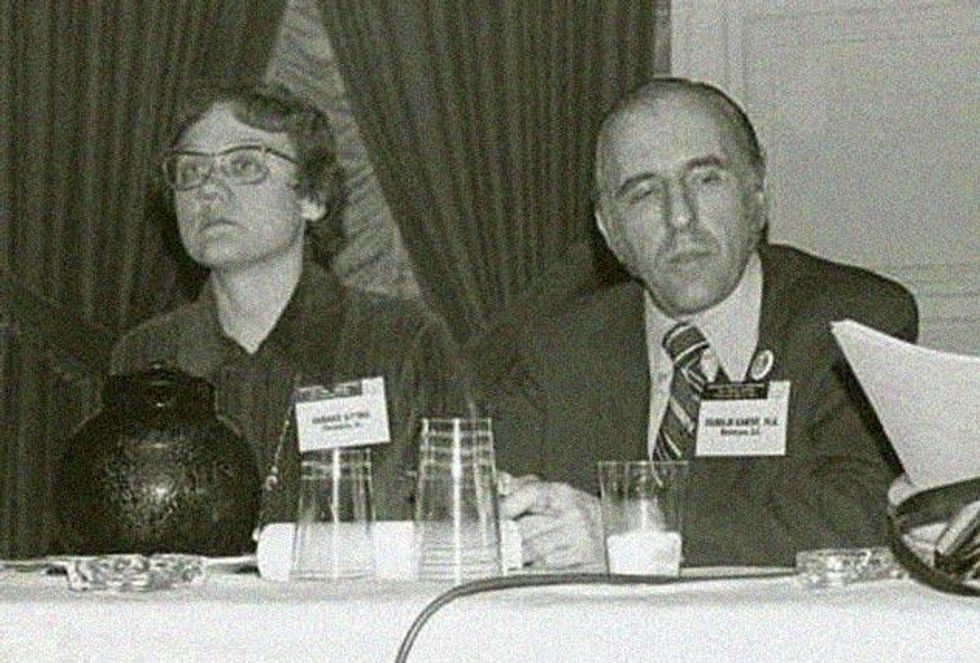 Above: Barbara Gittings, Frank Kameny, and John E. Fryer in disguise as Dr. H. Anonymous at an APA panel discussing psychiatry and homosexuality. Photo by Kay Tobin Lahusen (Wikimedia Commons)
Above: Barbara Gittings, Frank Kameny, and John E. Fryer in disguise as Dr. H. Anonymous at an APA panel discussing psychiatry and homosexuality. Photo by Kay Tobin Lahusen (Wikimedia Commons)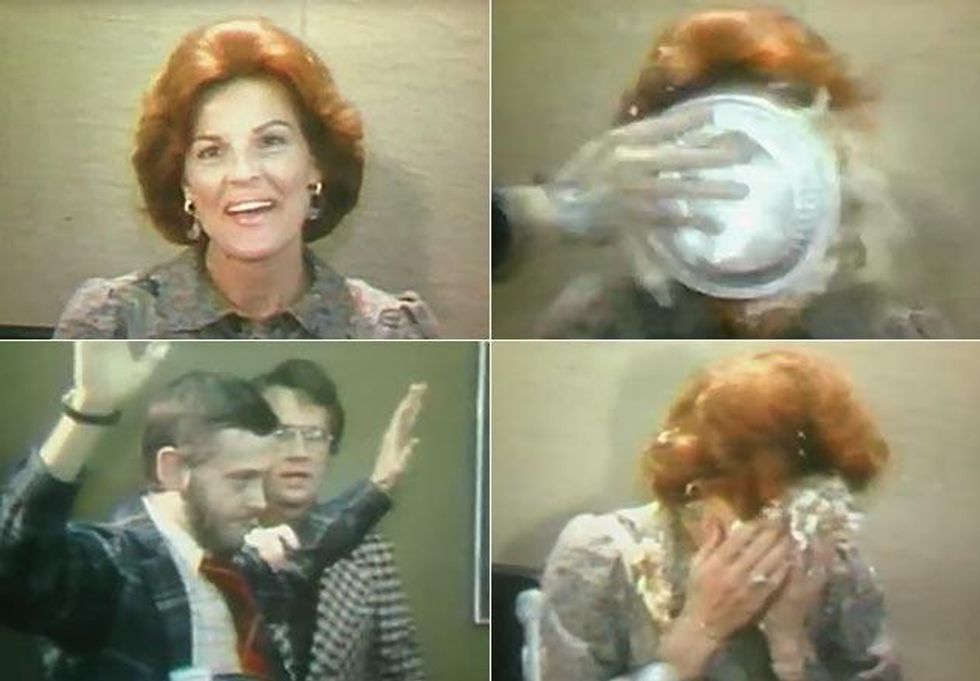 A Pie in the Face for Anita Bryant, 1977
A Pie in the Face for Anita Bryant, 1977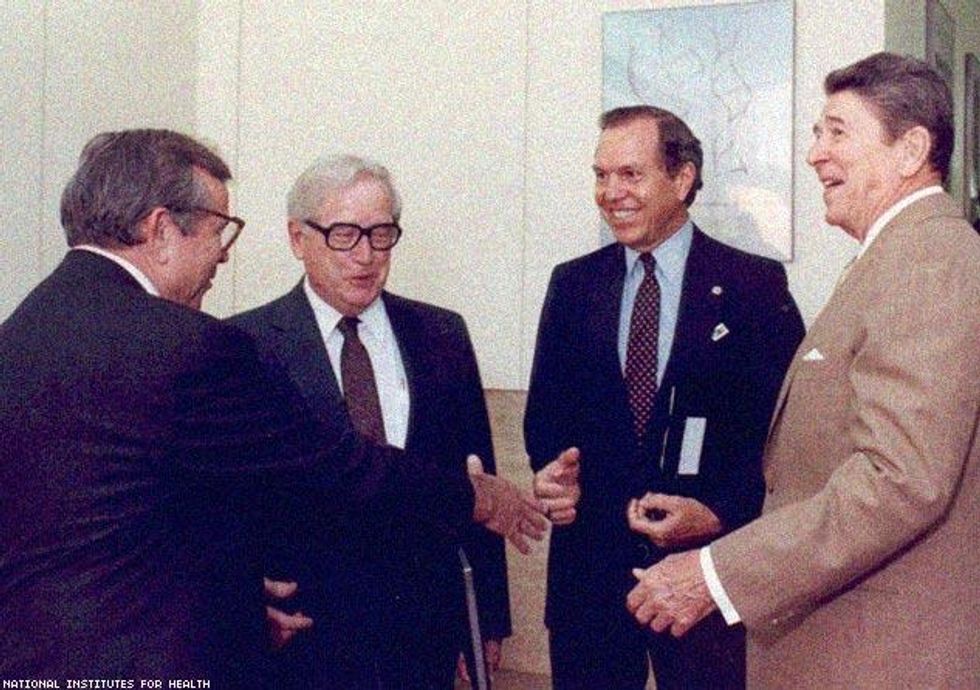 Above: Bowen (second from left); Reagan (far right).
Above: Bowen (second from left); Reagan (far right).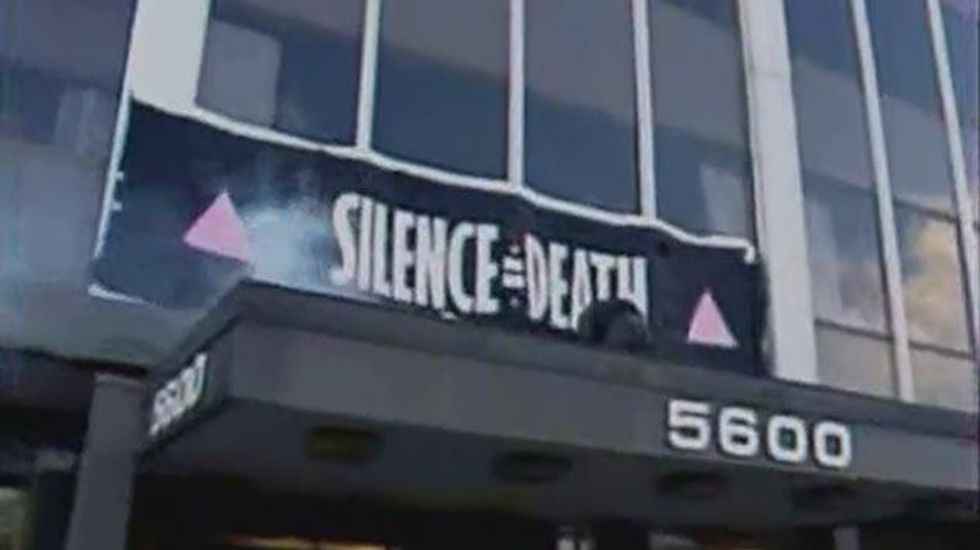 ACT UP Shuts Down the FDA, 1988
ACT UP Shuts Down the FDA, 1988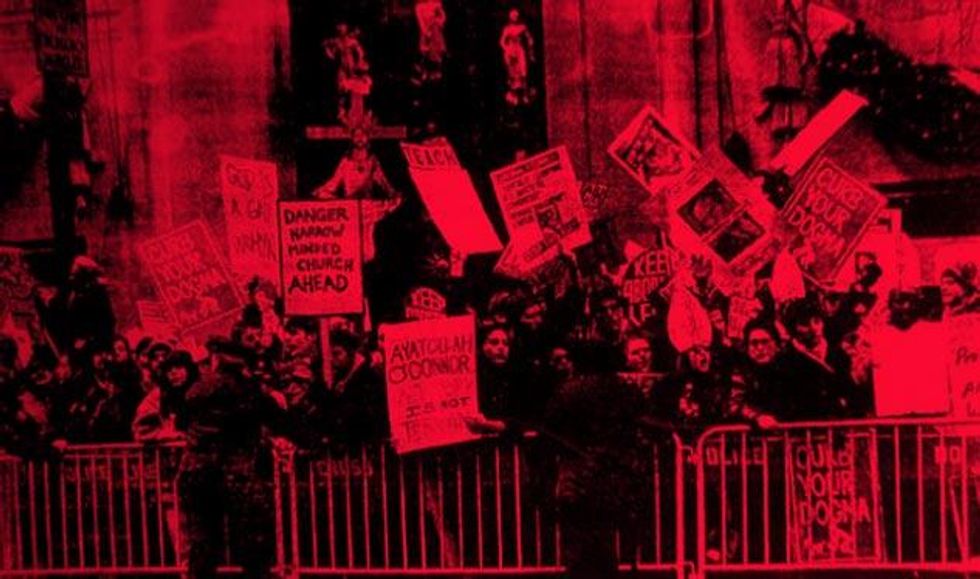 ACT UP Confronts Catholicism and Capitalism, 1989
ACT UP Confronts Catholicism and Capitalism, 1989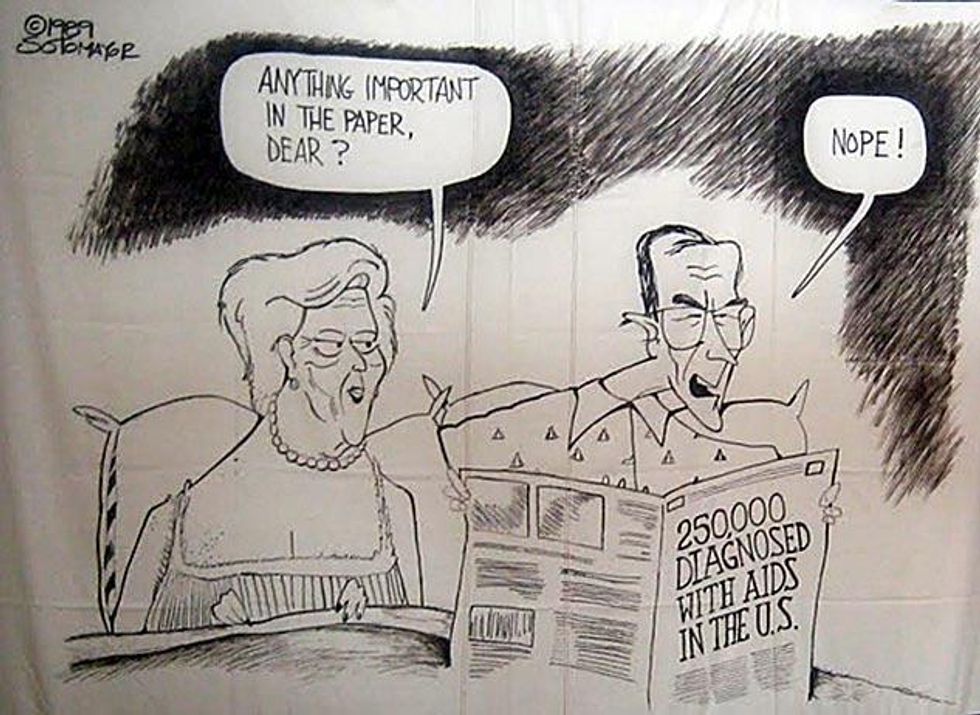 Above: A cartoon by Danny Sotomayor
Above: A cartoon by Danny Sotomayor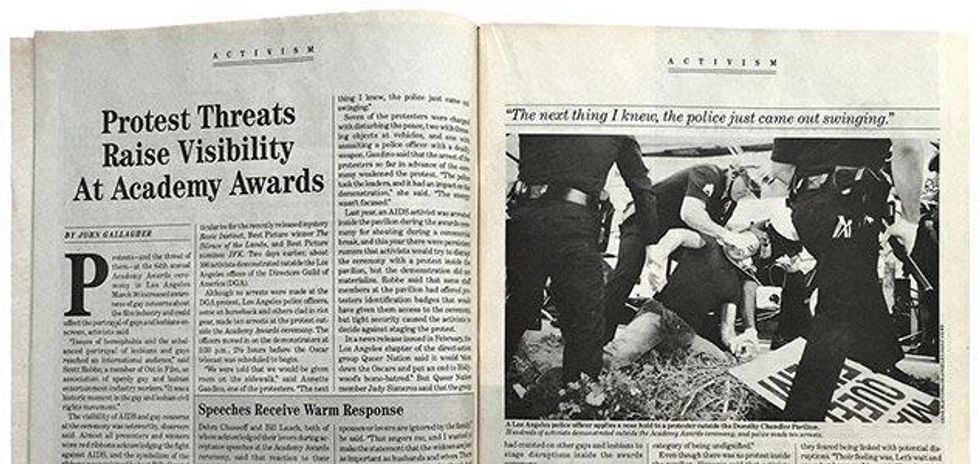 Queer Nation on the Oscars Red Carpet, 1992
Queer Nation on the Oscars Red Carpet, 1992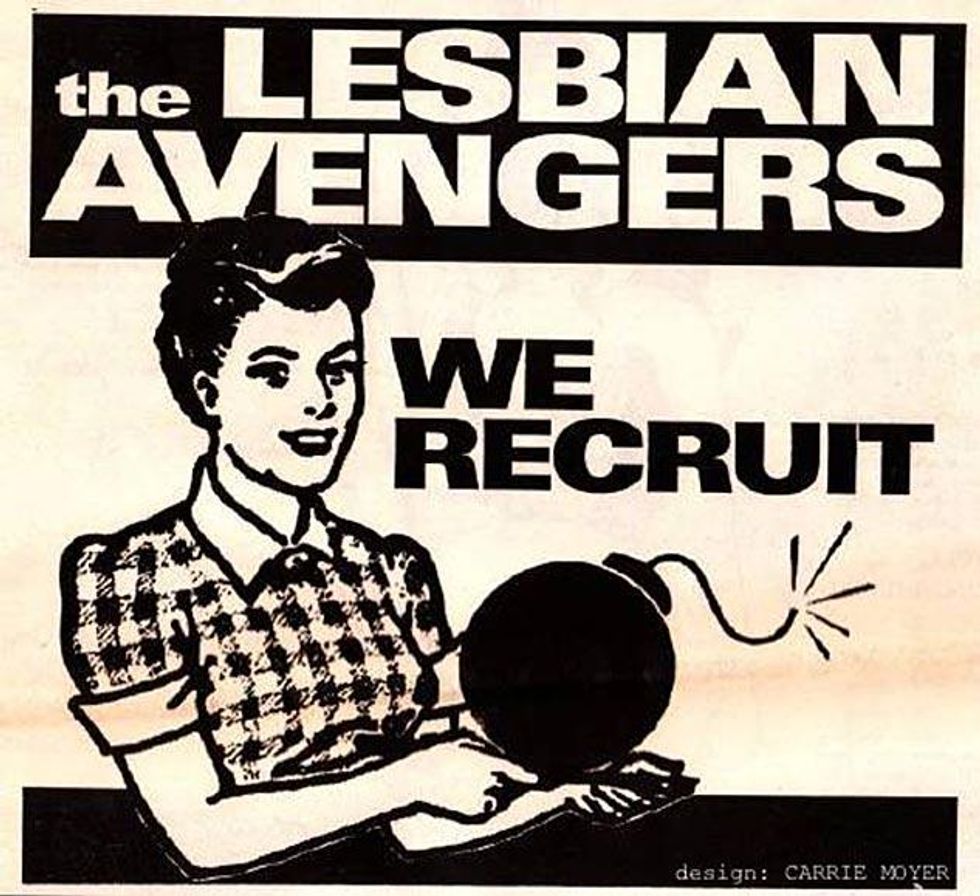 Lesbian Avengers Invade the U.N., 1994
Lesbian Avengers Invade the U.N., 1994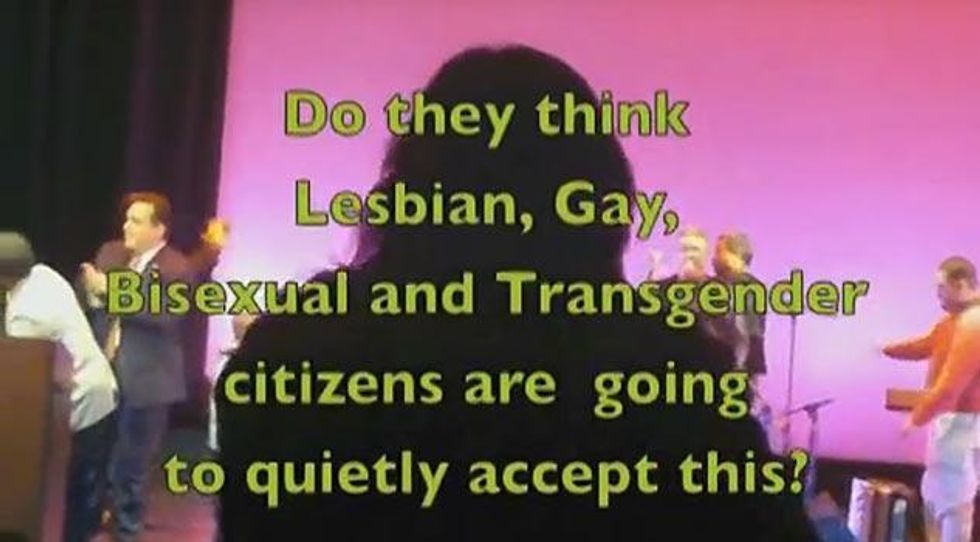 A Christmas Surprise for N.Y. State Senator, 2009
A Christmas Surprise for N.Y. State Senator, 2009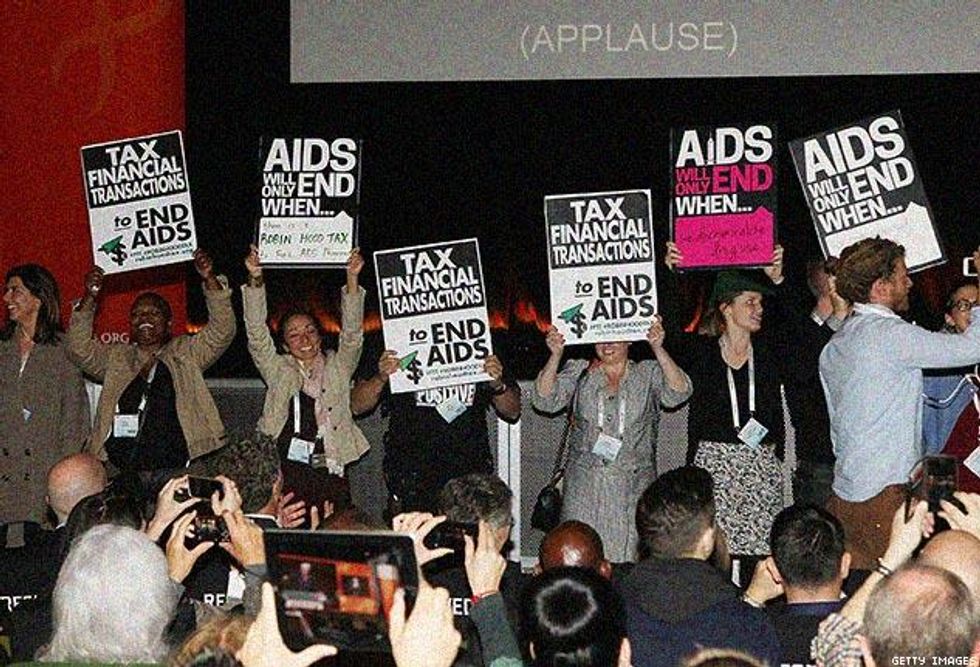 Activists Interrupt Bill Clinton at AIDS Conference, 2014
Activists Interrupt Bill Clinton at AIDS Conference, 2014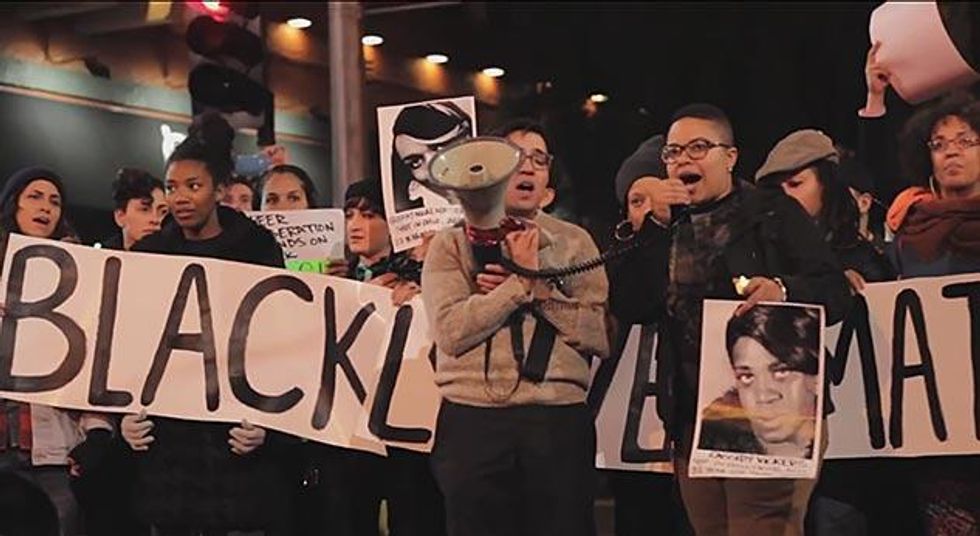 Queer People of Color Occupy Gay Bars in Castro, 2015
Queer People of Color Occupy Gay Bars in Castro, 2015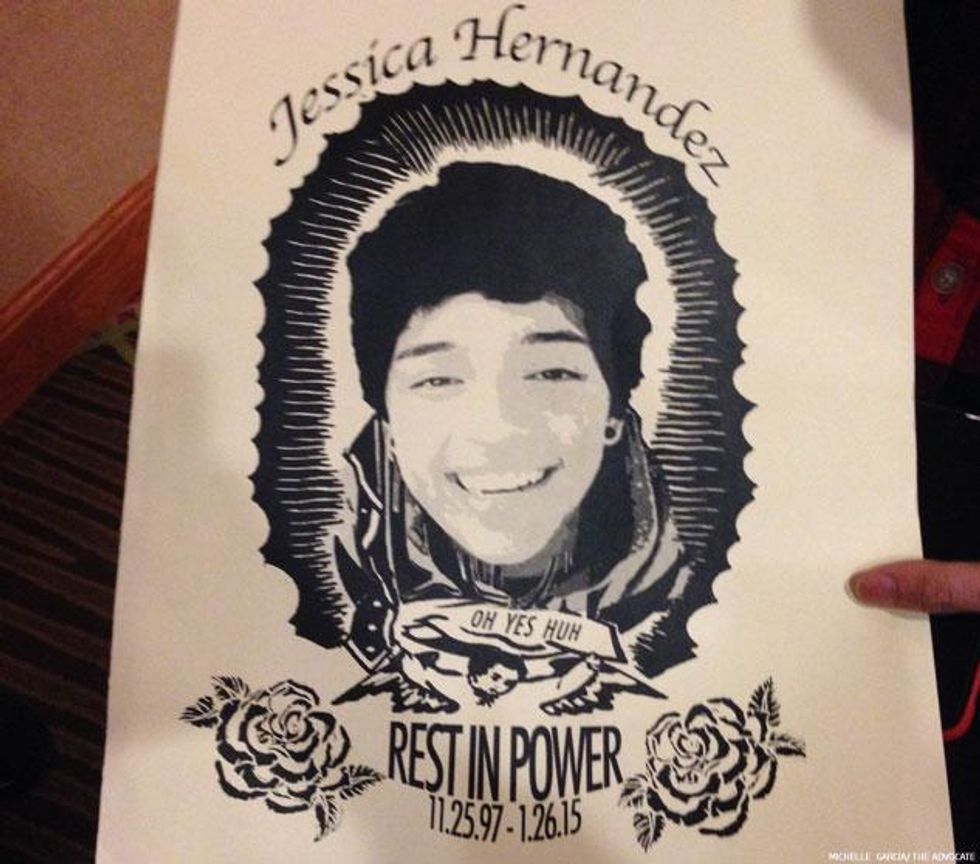 Trans Activists Storm the Stage at Creating Change, 2015
Trans Activists Storm the Stage at Creating Change, 2015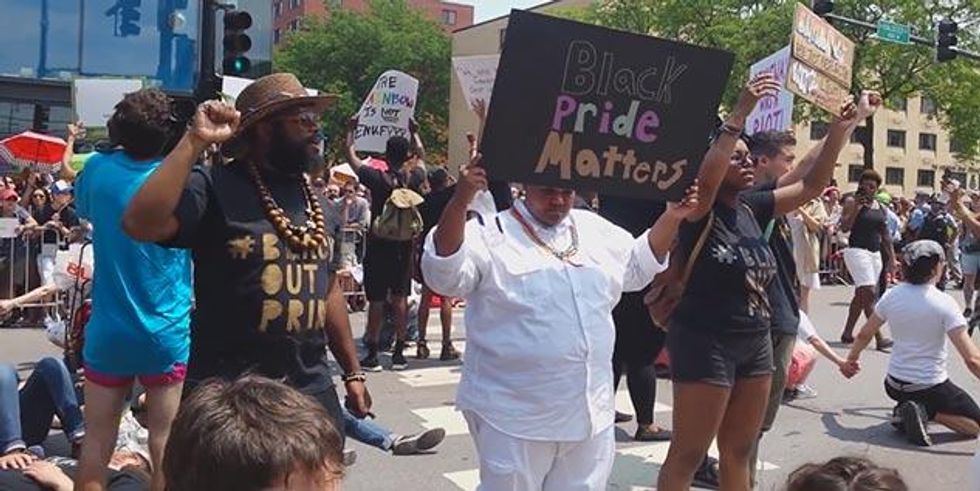 #BlackOutPride Protesters Disrupt Chicago LGBT Parade, 2015
#BlackOutPride Protesters Disrupt Chicago LGBT Parade, 2015

































































Charlie Kirk DID say stoning gay people was the 'perfect law' — and these other heinous quotes